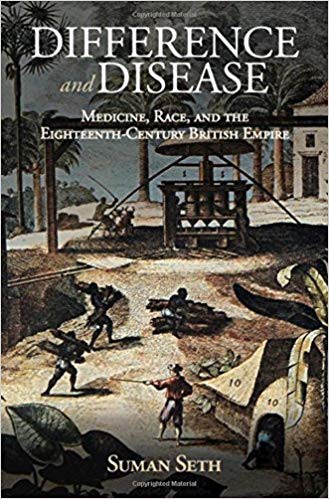Acclimate or die: Book examines disease in the British Empire
By Linda B. Glaser
Yellow fever, malaria, tetanus – in the West Indies and Africa, disease often felled more soldiers of the 18th century British Empire than battle. Without the benefit of germ theory, British doctors explained place-specific illness by the theory of “seasoning” (what later became known as acclimatization). As historian Suman Seth explains in his new book, “Difference and Disease: Medicine, Race, and the Eighteenth-Century British Empire,” those who survived were believed to be “seasoned to the climate” and no longer as vulnerable to disease.
The dangers of disease for those “unseasoned” to a place were well known, according to Seth, especially after catastrophic losses at Cartagena in the 1740s, where a third of British soldiers died within three weeks, virtually all because of disease. The Spanish won almost by default.
“Some of the soldiers assigned to the West Indies in the middle of the 18th century simply deserted,” said Seth, professor of science and technology studies in the College of Arts and Sciences. “They knew that death rates were incredibly high.”
Since people believed that the more different a place was from the places to which they were accustomed, the sicker it could make you, seasoning became a way of mapping how dangerous people thought a place was. This medical reading illuminates how the British understood their empire. It also explains why the British framed the northern American colonies as a “new Britain,” where those habituated to Britain wouldn’t suffer the kinds of diseases rampant in other parts of the empire.
A debate raged at the time over how much local knowledge rather than elite medical training mattered in the treatment of these seasoning diseases. If, as we believe in the 21st century, yellow fever in Africa is the same disease as yellow fever in India, then the best doctor will be the one trained at the best school regardless of where it is. But if diseases are specific to location, then the best doctor is the one with local experience and knowledge. As an example of how intense this debate was, Seth opens the book with the story of two doctors who killed each other over the argument.
The last third of “Difference and Disease” addresses race. “In the seasoning theory, if one population has more immunity, it’s not because their bodies have some intrinsic difference but because they’re seasoned to a place by being born there,” said Seth. “In principle, anyone can become seasoned to a climate, and anyone can lose their seasoning by leaving for long enough. It was believed that slaves in the West Indies got more of certain diseases than white people because of worse food and accommodations, as well as their treatment.”
But in the mid-18th century, writes Seth, race became a cause of illness (or susceptibilities to illness), rather than an effect of climate, diet and other environmental factors. The book’s final chapter addresses the rise of what he calls “race medicine,” at about the same time that “race science” emerges.
Race science seems to be at least partly a reaction to abolitionists, said Seth, and their humanitarian critiques. “There’s a facile argument that race was invented to justify slavery, but that makes no sense at all because you had slavery for centuries and it wasn’t racialized.” But with the abolitionists’ savage critiques of slavery, said Seth, opponents responded that while it’s wrong and un-Christian to enslave other humans, “They said, ‘it’s actually okay because these people are not in fact as human as we are. That whole ‘I need to be my brother’s keeper’ thing doesn’t have to apply if this person isn’t my brother.’” In the Enlightenment, science became a source of authority to cast nonwhites as lesser than human and race, rather than seasoning, as the cause of susceptibilities to disease.
Seth’s next project is a book that examines medicine and race from Hippocrates to the present.
Linda B. Glaser is a staff writer for the College of Arts and Sciences.
Media Contact
Get Cornell news delivered right to your inbox.
Subscribe

